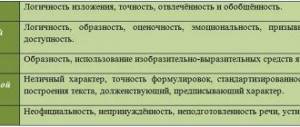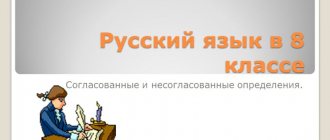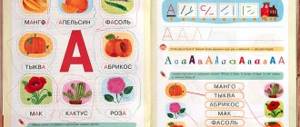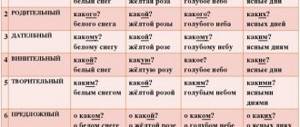System of Russian language lessons in 5th grade on the topic “Adjective”.
What role do adjectives play in a phrase, in a sentence, in a text? They emphasize the attribute of an object, help describe an object or phenomenon in more detail, make speech colorful and expressive.
What is the name of the means of artistic expression that helps to figuratively describe an object? EPITHET. All written phrases are epithets.
4). Choose words with the same root for the words: dark, rare.
Dark, darkness, darken, darkness. Rare, thin out, rarity, rare.
5). Let us draw a conclusion about the role of them. adj. in the text. They make the text colorful, expressive, and help the artist convey all shades of feelings and impressions.
6). What syntactic role do they play? adj. in a sentence? Definition and predicate.
7). Syntax five minutes.
From above it seemed like a huge dark sea.4
8. Summing up the lesson. Generalization of knowledge using the table “Adjective as a part of speech.” (The teacher hangs it on the board.) Assessment of the student’s knowledge.
9. Homework: A story about an adjective as a part of speech, ex. No. 571 (written), write down 10 phrases with adj. from the story “Vasyutkino Lake”.
Lesson #2
Topic: Adjective as a part of speech. (Reinforcement.)
Goal: to consolidate the knowledge and skills acquired in the previous lesson.
Tasks:
- develop the ability to find adjectives in the text, associate them with the nouns on which they depend, determine their role in phrases and sentences;
-learn to select synonyms and antonyms for adjectives, determine direct and figurative meanings;
-continue to develop the skill of determining the morphological features of an adjective;
-develop an idea of the epithet;
-instill interest in literature, language, love for nature, for the homeland, and cultivate a spiritual and moral personality.
Work on speech development: an oral story about an adjective as a part of speech, elements of analysis of a prose text (an excerpt from the story “Vasyutkino Lake” by V.P. Astafiev, studied in literature lessons.)
Equipment: individual cards No. 1-4, table “Adjective as a part of speech”, handouts with text for analysis (excerpt from V.P. Astafiev’s story “Vasyutkino Lake”).
During the classes:
1. Organizational moment.
2. Checking homework. 1). Self-test of home exercise No. 571, performed on the board.
No. 571. Break the text into two paragraphs. Copy using the missing division marks. Underline the predicates expressed by adjectives.
Friends say about Natasha that she is good. But this can be said about many people. And here is what her mother, teachers, and coach added about Natasha. Mom is glad that Natasha is kind, affectionate, sympathetic, sensitive, and sincere. Teachers respect the girl because she is modest, demanding of herself, and diligent. The coach believes that she is hardworking and persistent.
Educational material. 5th grade. An adjective as a part of speech. - presentation
Educational material. 5th grade. Adjective as part of speech
Adjective as a part of speech Name the grammatical basics. Give characteristics to the sentences. Name the grammatical basics. Give characteristics to the proposals. 1. I received your nice letter from you. (A.S. Pushkin.) 2. Golden foliage swirled in the pinkish water on the pond, like a light flock of butterflies, fadingly flying towards a star. (S. Yesenin).
Comparison of the same text without and with adjectives Snow was white everywhere. The stoves were heated in the villages, and the smoke did not dissolve in the air, but lived as if separately from it, then disappearing without a trace. The forests were visible clearly and close, there was silence everywhere. There was pure white snow everywhere. Daytime stoves were heated in the villages, and the golden smoke did not dissolve in the air, but lived as if separately from it, then disappearing without a trace. The forests, pockmarked after yesterday's snowfall, were visible clearly and close, there was a thick, bright silence everywhere. (According to V. Belov)
Vocabulary work Name the epithets and metaphors from the quatrain And all around the pearly dew cast scarlet sparkles, And over the silver lake the Reeds, bending over, whispered. S. Yesenin What do epithets and metaphors add to the text? -Which part of speech words are used by the author in these epithets? Choose synonyms for the adjective SCARLET..
Late autumn 1. The weather is gloomy, rainy, damp. 2. The sun is cold, distant, cheerless. 3. The sky is gray, pale, gloomy. 4.Trees are bare, dark, damp. 5. Leaves are brittle, dry, brown. 6. The wind is cold, strong, sharp. 7. The rain is light, continuous, boring. Write an essay “Russian Winter” based on this sample.
Spelling vowels in case endings of adjectives Agree the adjectives given in brackets with the nouns. Highlight the endings of the adjectives. Determine the case. On (clean) sand; about the (horrible) noise; o (formidable) howl; with (beautiful) dawn; into a (quiet) grove; among (tall) grass, about (delicate) lily of the valley; on a (long) journey; (May) breeze; in a (sweet) dream; about (beautiful) singing; in (wonderful) art; about the (foggy) evening.
Full and short adjectives Full and short adjectives Highlight the grammatical bases of sentences and definitions. 1. The language should be simple and elegant. (A. Chekhov) 2. The air is as clean and fresh as a child’s kiss, the sun is bright, the sky is blue. (M. Lermontov.) 3. In the winter cold, everyone is young. 4. The fish is small, but the fish is sweet. (Proverbs.) 5. A green meadow, like a wonderful garden, is fragrant and fresh at dawn. Bouquets of beautiful rainbow flowers are scattered on it. (A. Surikov.) 6. The air is clean and transparent.
Describe the heroes of I.A. Krylov’s fables: crow, pig, fox, wolf, using short adjectives. Form them from the proposed full forms. Write down the sentences you made. 1.Stupid, vain, arrogant.1.Stupid, vain, arrogant. 2. Cunning, crafty, insincere, flattering. 2. Cunning, crafty, insincere, flattering. 3.Ignorant, rude, ungrateful.3.Ignorant, rude, ungrateful. 4.Greedy, evil, unfair.4.Greedy, evil, unfair.
Highlight the suffixes of adjectives. The knife is the oldest cutlery. Before the Bronze Age, knives were made of stone. With the advent of metal, kitchen knives became iron or steel. Table serving knives were silver and gold. The handles of the knives were decorated with precious stones and elaborate carvings. The knives owe their rounded ends to Napoleon. He banned the production of pointed knives.
Read and title the text, copy it down, divide the text into sentences; placing punctuation marks and restoring missing letters. It’s a good(?) winter day, the air is fresh(?) transparent and clean through the cloud…occasionally…a ray(?) of the sun breaks through and disappears again…it’s not hot(?) but bitter…nourishing and bright, the wind is burning(?) and impetuous, but children are not afraid of m...roz, they are always in...villages and b...dry.





